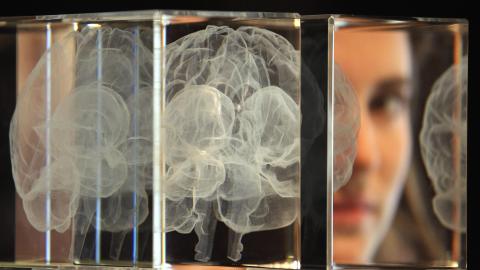Mind and God: The new science of neurotheology

Credit: Dan Kitwood via Getty Images
- Neurotheology is a field that unites brain science and psychology with religious belief and practices.
- There are several indirect and direct mechanisms that link spirituality with improved mental health.
- Compassion and love are positive emotions that will make your brain healthier.
The field of neurotheology continues to expand from its early origins several decades ago to the present day. In its simplest definition, neurotheology refers to the field of scholarship that seeks to understand the relationship between the brain and our religious and spiritual selves. As I always like to say, it is important to consider both sides of neurotheology very broadly. Thus, the “neuro” side includes brain imaging, psychology, neurology, medicine, and even anthropology. And the “theology” side includes theology itself, but also various aspects related to religious beliefs, attitudes, practices, and experiences.
The mental health benefits of spirituality
Neurotheology also ranges from considering very esoteric concepts including questions around free will, consciousness, and the soul, to very practical concepts such as understanding how the brain functions and the relationship between spirituality and physical and mental health. This latter topic might be called “applied neurotheology.” Applied neurotheology, therefore, seeks to understand the health-related aspects pertaining to our brain and our spiritual selves. In particular, we can try to understand how being religious or spiritual, or performing various spiritual practices, might be beneficial to our overall health and well-being. In our latest book, entitled Brain Weaver, we consider this important dimension of human brain health.
Even for those who are not religious, pursuing practices such as meditation and prayer — even when secularized — can be beneficial for reducing stress and anxiety.
A growing number of studies have shown how spirituality and mental health are linked. Importantly, studies have shown that those who are religious and spiritual tend to have lower rates of depression, anxiety, and suicide. This is true across the age spectrum with studies of adolescents showing that religious and spiritual pursuits are protective against mental health problems. And many adults cite religious and spiritual beliefs as important for coping with various life stressors.
Indirect mechanisms

If there is a relationship between spirituality and positive mental health, we might question what the mechanism of action might be. I have typically divided the mechanisms into indirect and direct ones. The indirect mechanisms have to do with specific aspects of a given tradition that end up having ancillary mental health benefits. For example, going to church or other social events that are part of a religious tradition can be beneficial because social support, in and of itself, is beneficial to our mental health. The more people that we have in our social support network, the better we are at coping with various life stressors including problems with jobs, relationships, or health.
Most religions also teach people to avoid a lot of high-risk behaviors that can be very detrimental to our mental health and well-being. For example, most religions teach us to avoid alcohol and drugs, to not be promiscuous, and to try to be compassionate and charitable to others. By following these teachings, people will naturally avoid mental health problems such as substance abuse and tend toward being more optimistic and less depressed. These effects have nothing to do with being religious per se and everything to do with following a religion’s advice.
Another interesting indirect mechanism of action related to religion has to do with diet and nutrition. Diet and nutrition are frequently overlooked when it comes to good mental health, even though research increasingly indicates they are essential. Many traditions ask individuals to follow certain dietary guidelines. For example, Hindus tend to have vegetarian diets, and most research to date shows that eating a more plant-based diet with a lot of low-inflammatory foods is good not only for your body but for your brain as well. In fact, we are currently performing a study with patients who have chronic concussion symptoms to determine the effect of dietary improvements on overall brain function.
Direct mechanisms

The direct mechanisms of action have to do with specific spiritual practices and even a person’s personal sense of spirituality. Much of my research over the past 30 years has been to study the brain while people engage in different practices such as meditation or prayer. We have even observed brain changes associated with unique spiritual practices such as speaking in tongues or trance states. The brain effects related to these practices are quite remarkable and diverse. It should come as no surprise since these practices affect people on many different levels, such as the way people think, feel, and experience the world around them. Thus, we should expect to observe physiological differences in the parts of the brain involved with these practices.
Meditation and prayer, for example, activate the frontal lobes as well as the language areas of the brain, and research demonstrates that this occurs not only while the practice is performed but over the long-term as well. Our study of Kirtan Kriya meditation showed improvements of about 10 to 15 percent in cognition as well as reductions in stress, anxiety, and depression. These were associated with baseline changes to the brain’s frontal lobe functions, which regulate these cognitive processes and modulate emotional responses.
More recent research has been exploring the effects of these practices on larger brain networks, and perhaps more important, specific neurotransmitter systems. One of our recent studies of a spiritual retreat program showed significant changes to the areas of the brain that release dopamine and serotonin. These are areas known to be involved in both cognition and emotional health. And there are a growing number of clinical studies which have documented the value of various spiritual practices or religiously oriented therapies for helping people manage a variety of mental health conditions including depression, anxiety, and ADHD as well as neurological conditions like Alzheimer’s and seizure disorders.

Finally, a personal sense of spirituality may be protective in and of itself. When people feel connected to all of humanity, a higher power, or the entire universe, that experience gives people a sense of meaning and purpose in life and an optimistic perspective on what the future holds. A number of research studies have shown that having such faith can be beneficial to your overall physical and mental health.
Improving brain health with applied neurotheology
Applied neurotheology can teach us the value of exploring our religious and spiritual side as a way of improving our mental health and well-being. Even for those who are not religious, pursuing practices such as meditation and prayer — even when secularized — can be beneficial for reducing stress and anxiety. Connecting with the larger world — by going on a nature walk, socializing with friends and family, or trying to make your neighborhood a better place by helping others — leads to a greater sense of compassion and love, positive emotions that will make your brain healthier.
Dr. Andrew Newberg is a neuroscientist who studies the relationship between brain function and various mental states. He is a pioneer in the neurological study of religious and spiritual experiences, a field known as “neurotheology.” His latest book is Brain Weaver.





